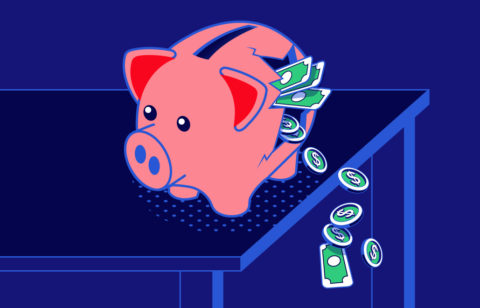Shock proofing your finances during normal times may not seem necessary, but when is the last time we had a long streak of normal times? Over the past year, the COVID-19 pandemic and subsequent lockdowns have left millions of people unemployed or underemployed, with no real end to the crisis in sight. A decade earlier, the Great Recession led to high levels of unemployment and other financial calamities for millions of Americans as well. Any financial crisis is bad news, but it can be even worse if you’re not prepared for it. Don’t wait until you’re out of work and all the bills are piling up on your dining room table to start planning for tough times. Here are some great tips to help you take control of your finances and make them emergency proof.
Start an Emergency Savings Account
One of the first things you should do to take control of your finances is to establish an emergency savings account. While this may seem like obvious advice, it’s surprising how many people don’t take it to heart; about half of Americans don’t have the savings on hand to cover unexpected expenses, such as a car or home repair. So, if you’re one of the people without any cash on hand, start your emergency savings today. Even if you don’t have a large amount of cash on hand, you can still begin saving for the unexpected. Start a separate savings account and automatically transfer a modest amount of funds there each month to build your emergency savings up. You may want to use that recent $600 stimulus check to give your emergency savings a jump-start.
Manage Debt Levels
Another way to shockproof your finances is to get all your personal debt under control. If you have high levels of credit card and other debt when a crisis hits, interest fees and high monthly minimum payments will put a further strain on your limited financial resources. Additionally, you may want to have the leeway to rely upon your credit cards, at least temporarily, while you’re navigating a financial crisis. It’s hard to do that if you are already deep in debt when the crisis occurs. Therefore, work to pay down your debts while times are good and you have disposable income. If you don’t feel like you can take care of your debts on your own, you could consider using a debt settlement company, such as National Debt Relief. However you do it, effective debt management is a great way to make your finances more resilient for the long term.
Get a Side Hustle
If you want to take control of your finances, consider getting a side hustle or part-time job. A side hustle will provide you additional income, which you can use to build your emergency fund or to allocate toward other financial priorities, such as investing for retirement or paying down debt. Additionally, having a side hustle will help make you more financially resilient. If you’re laid off or furloughed in your primary profession, you’ll still have income coming in from your secondary line of work to mitigate the impact. There are many different types of side hustles, and the internet age has made it easier than ever to find one that fits your schedule. Therefore, whether you end up driving for a rideshare platform such as Lyft or Uber, or working as a freelancer on Upwork, a good side hustle can help lessen the blow of any financial shock you may experience.
Leverage Public and Private Support
If you’re facing an unexpected financial emergency, another way to limit the impact is to take advantage of public and private programs that are available. There are often funds and services that you can leverage that can help keep you financially sound until you’re back to work or the crisis is otherwise averted. For example, in 2020, the CARES Act and a subsequent spending bill passed relief for individuals and businesses impacted by the COVID-19 pandemic. That relief included extended unemployment insurance, $600 individual stimulus payments, and billions of dollars of financial relief for small business owners and entrepreneurs through the Paycheck Protection Program (PPP). Many nonprofits provided tremendous assistance to individuals and small businesses over the past year as well. Tapping into public and private resources like these can often have a tremendous impact on your financial situation when a crisis hits.
Take Control of Your Finances Today
It’s never too late to start shock proofing your finances, even if the crisis has already hit. The sooner you strengthen your finances and prepare yourself for adversity, the better chance you’ll have of making it through an unexpected financial event. So, take stock of your current financial situation, and then begin building the resiliency you’ll need to go the distance when the times get tough.





